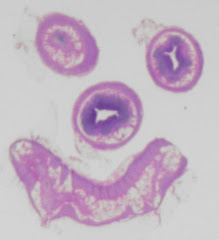I received an interesting comment to my previous post, presumably from a Pathologist, which stated that s/he had not yet met a credible pathologist who would endorse a PA (but also considered that the PAs with whom s/he had worked were not worth endorsing).
I wonder if it is a safe assumption that this person has a low opinion of any pathologist who would endorse a PA. More likely, this person is not happy with the 'product' provided by her/his PAs (assuming s/he has PAs).
I recognize that there are many political issues and biases with which a few have had to deal if their experience with PAs is relatively new. It is a challenge for the PAs as well. PAs are not perfect; no one is. A pathologist who views a PA as an extension of her-/himself and teaches and encourages that PA to provide the quality of work that is required, is one who has, in my opinion, the correct attitude. If one is looking for faults, one is certainly going to find them, no matter who one is looking at. PAs are not MDs. Without hands-on support and supervision, they ought not be expected to have the same insights into the subtle nuances (even the not-so-subtle, for that matter) of pathology as pathologists have. This is not to say that they cannot, with the appropriate training, do perfectly adequate Gross Descriptions however. PAs depend upon the active input of pathologists into their day to day practice in order to improve their knowledge base so that they may provide Gross Descriptions which more and more closely approximate those which would be rendered by pathologists. I'd suggest that if the person commenting is dissatisfied with her/his PAs, that s/he: 1. hire individuals with a better background (a BSc will soon be the prerequisite for admission to a PA training course in Canada, as has long been the situation in the USA) and, more importantly, 2. provide on-going support for the PAs by giving regular feedback and instruction.
There is currently no college, in any province, for PAs. Any CME activities are purely optional and self-directed (if not by the employer or pathologist). With minimal encouragement, most PAs will gladly participate in seminars and rounds in order to further their knowledge so that they can improve the quality of their work. They will, in fact, do this even though they cannot claim CME credits (yet). I encourage all pathologists, whether they are just getting to know PAs or whether they have had PAs working for them for years, to continue to work WITH their PAs, rather than apart. Given the chance, PAs can be very good team players.
I wonder if it is a safe assumption that this person has a low opinion of any pathologist who would endorse a PA. More likely, this person is not happy with the 'product' provided by her/his PAs (assuming s/he has PAs).
I recognize that there are many political issues and biases with which a few have had to deal if their experience with PAs is relatively new. It is a challenge for the PAs as well. PAs are not perfect; no one is. A pathologist who views a PA as an extension of her-/himself and teaches and encourages that PA to provide the quality of work that is required, is one who has, in my opinion, the correct attitude. If one is looking for faults, one is certainly going to find them, no matter who one is looking at. PAs are not MDs. Without hands-on support and supervision, they ought not be expected to have the same insights into the subtle nuances (even the not-so-subtle, for that matter) of pathology as pathologists have. This is not to say that they cannot, with the appropriate training, do perfectly adequate Gross Descriptions however. PAs depend upon the active input of pathologists into their day to day practice in order to improve their knowledge base so that they may provide Gross Descriptions which more and more closely approximate those which would be rendered by pathologists. I'd suggest that if the person commenting is dissatisfied with her/his PAs, that s/he: 1. hire individuals with a better background (a BSc will soon be the prerequisite for admission to a PA training course in Canada, as has long been the situation in the USA) and, more importantly, 2. provide on-going support for the PAs by giving regular feedback and instruction.
There is currently no college, in any province, for PAs. Any CME activities are purely optional and self-directed (if not by the employer or pathologist). With minimal encouragement, most PAs will gladly participate in seminars and rounds in order to further their knowledge so that they can improve the quality of their work. They will, in fact, do this even though they cannot claim CME credits (yet). I encourage all pathologists, whether they are just getting to know PAs or whether they have had PAs working for them for years, to continue to work WITH their PAs, rather than apart. Given the chance, PAs can be very good team players.



Without hand on support and supervision....so do we have to babysit now??? YOur opinion of PA's is overestimated to say the least. If they are grossing my patient's specimens, I would expect them to have insight into the subtle nuances you speak of. Maybe we could train some monkeys to do the job!!!
ReplyDelete